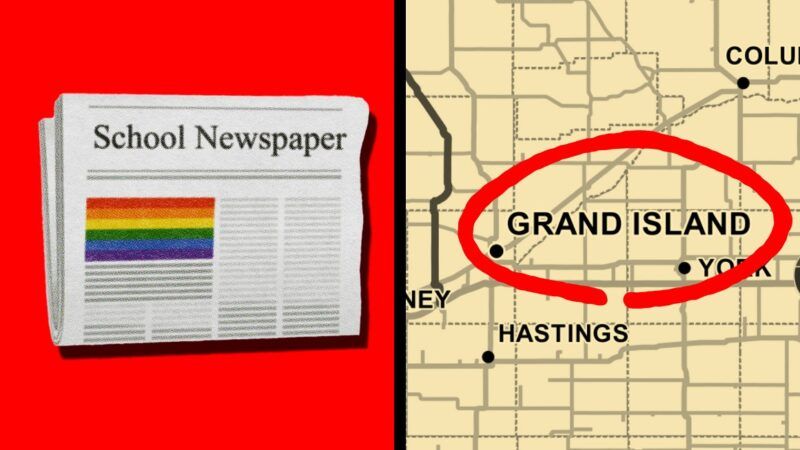Nebraska High School Shuts Down 54-Year-Old School Newspaper After Students Publish LGBT Pieces
This is a clear attempt by the administration to tamp down on opinions the adults don't like.

You don't have to read very far between the lines to figure out why the journalism program at Northwest High School in Grand Island, Nebraska, was shut down in June.
Before school administrators went mum as the press started investigating what had happened, students and school board staff had been made well aware that the administrators did not like what the newspaper was publishing. The Grand Island Independent—which also printed the school's newspaper, Viking Saga—reports that the school's year-end newspaper had a number of LGBT-related stories and discussed the origins of Pride Month in June. The issue also included several stories that weren't about LGBT issues, but it seems it was all the nonheterosexual content that did them in:
Northwest Public Schools board Vice President Zach Mader said that in the past, "I do think there have been talks of doing away with our newspaper if we were not going to be able to control content that we saw (as) inappropriate."
He cautiously explained the apparent reason for the Saga's demise.
"The very last issue that came out this year, there was… a little bit of hostility amongst some," the school board member said. "There were editorials that were essentially, I guess what I would say, LGBTQ."
The school had been publishing the newspaper for 54 years. Four days after that issue was printed in May, a school district employee contacted the Grand Island Independent press to cancel printing services. The Northwest employee, in an email, said that the school was ending the journalism program "because the school board and superintendent are unhappy with the last issue's editorial content."
To make it clear that it wasn't the article about the achievements of Future Business Leaders of America that triggered the drastic decision, The Grand Island Independent also reports that in April, students who worked on the Viking Saga were reprimanded by district officials for publishing their "preferred pronouns" and using their preferred names in their bylines. They were ordered to use their birth names, which was a problem for a trans student who was working at the newspaper.
At first glance, one can think that this might not be censorship, that perhaps the school is thinking of changing the curriculum and is making some cuts. But Northwest Public Schools Director of Teaching and Learning Jeanette Ramsey, who told The Grand Island Independent that she was the primary decision maker about the school's curriculum, washed her hands of what happened to the journalism program. "I was not involved in that decision at all. I was zero involved in that decision," she told The Grand Island Independent. The journalism teacher declined to be interviewed.
Despite the recent uptick in culture war battles over public school curricula and LGBT issues, these kinds of school press battles between students and administrators about censorship have been going on for decades. In 1988, the Supreme Court gave school administrators wide authority to censor school newspapers in Hazelwood v. Kuhlmeier, despite the 1969 Tinker v. Des Moines Independent Community School District decision that ruled that students do not lose their First Amendment freedoms on school grounds.
Completely shutting down a newspaper is a pretty crappy decision from a public education perspective. If education in writing and debate is one of the fundamental expectations of a public school, the student newspaper has long been a place for teens to practice these skills. The complaint by administrators isn't about the quality of writing by the students; they don't like what the students are saying and the decisions they're making. Would the school cancel an entire English class if it didn't like the opinions students were expressing in their essays?
We would hope not, but the difference here is that the opinions and thoughts of the students are being widely distributed through Viking Saga. And so this is clearly an attempt by the administration to tamp down on opinions the adults don't like. This isn't about controlling teachers who express "woke" opinions in classrooms in ways that might not be appropriate for class discussions; it's about censoring students for expressing "woke" opinions in spaces that make adults uncomfortable.


Show Comments (156)